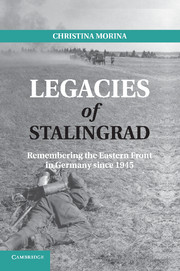2 - Cold War
Political Memory of the Eastern Front in Divided Germany
Published online by Cambridge University Press: 07 October 2011
Summary
Do they know that the birch crosses on the graves of new “Barbarossa”– adventurers will stand not in Stalingrad but in Cologne?
Neues Deutschland, June 1961I think that if we are to enter a new era in our relations – and that is our sincere wish – that then we should not look into the past too deeply, because then we will only place obstacles before ourselves.
The beginning of a new era also requires a psychological cleansing.
Konrad Adenauer, in Moscow, September 1955In 1949, a two-state solution partially ended the Allied occupation of Germany. The Cold War had drawn each of these semisovereign states into opposite political camps. Just a few years after the end of World War II, a new global conflict cast its shadows on international relations and brought with it the division of Germany. Memories of the last “hot war” were still vivid, yet present politics inescapably ruled memories of the past. Memories of the Eastern Front played an important role in the quest for political power and legitimacy in divided Germany because they influenced political decisions and diplomatic relations in various ways, and vice versa. This is best underscored by pointing to and exploring the only fitting synonym for political memory: master narrative.
Master narratives of a historical event often constitute a conglomeration of a certain worldview, political considerations, and personal experiences, which politicians communicate in public speeches and commemoration ceremonies. To varying degrees, these official narratives can be called propaganda because they create images of the past designed to fit in with a certain ideological and political agenda. Ulbricht and the SED had the Soviet model and the entire apparatus of a one-party state at their disposal – along with an efficient security service – to articulate and transport their version of the Eastern Front war and its central political lessons: the righteousness of Soviet domination and the necessity for German-Soviet friendship. The fundamentally different political and structural preconditions for the genesis of the Eastern Front memory in the dictatorial GDR and the pluralist West German state thus determined not only its content but also its political functions.
- Type
- Chapter
- Information
- Legacies of StalingradRemembering the Eastern Front in Germany since 1945, pp. 67 - 105Publisher: Cambridge University PressPrint publication year: 2011

